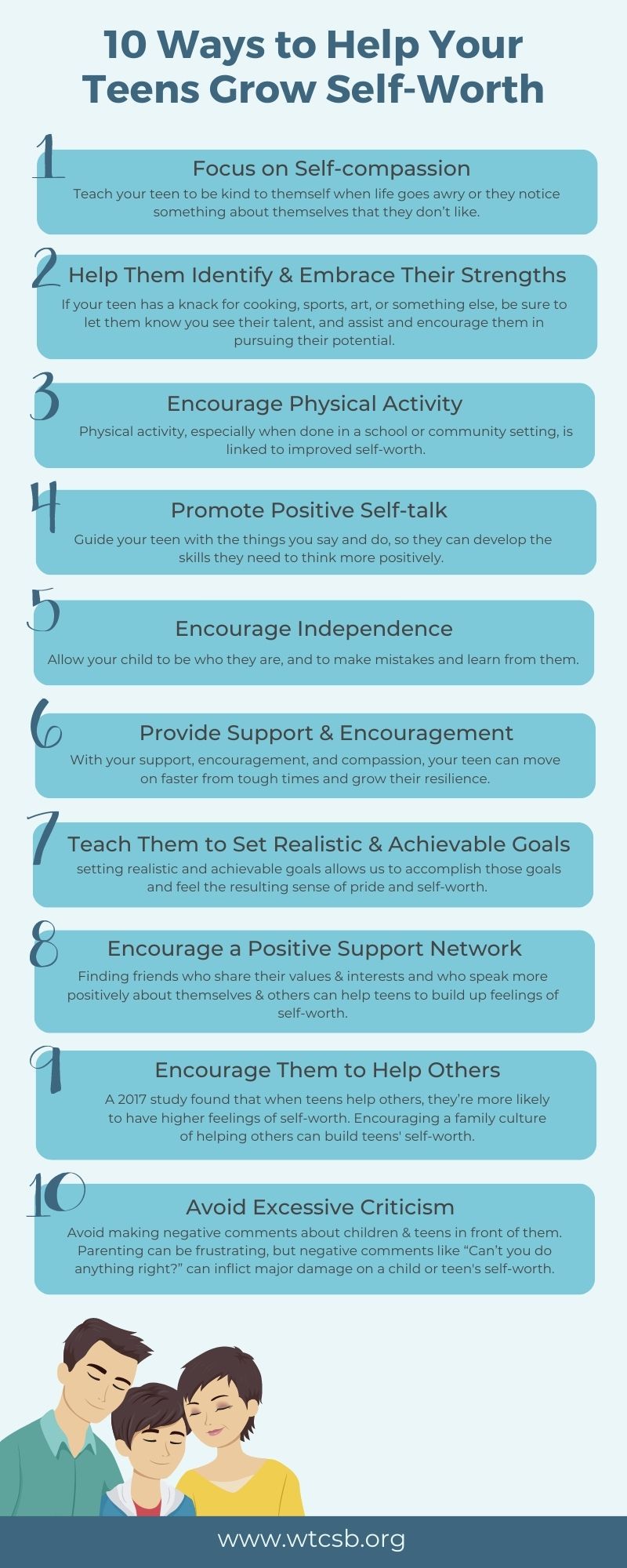If someone asked you to describe yourself right now, in terms of your value as a person, what would you say?
Would what you have to say be more positive or more negative, overall? And where do your ideas about yourself come from? From within, or from others?
How we feel about ourselves, and our perceived value and worth we have as a person, is our self-worth. Positive self-worth is crucial for mental wellness, and it’s especially important for teens.
What Is Self-worth?
You’ve probably heard of self-esteem, but what is self-worth, and how are the two different?
While the terms are sometimes used interchangeably, the American Psychological Association (APA) Dictionary of Psychology defines self-worth as an “individual’s evaluation of himself or herself as a valuable, capable human being deserving of respect and consideration” and self-esteem as the degree to which someone perceives their self in a positive light, including their “physical self-image, view of his or her accomplishments and capabilities, and values and perceived success in living up to them, as well as the ways in which others view and respond” to them.
The APA dictionary goes on to say that “positive feelings of self-worth tend to be associated with a high degree of self-acceptance and self-esteem.” So the two are distinct, but related – people who have a high level of self-worth also tend to have higher self-esteem.
Why Self-worth Matters for Teens
Terry Clark-Jones, a Certified Family Life Educator and Senior Extension Educator with Michigan State University Extension, describes self-worth as the understanding that each of us are of value and have purpose. Clark-Jones, whose areas of expertise include emotional education, says that this understanding is especially important for teens for a number of reasons:
“First, adolescents who think of themselves as valuable are more likely to be willing to try something new, to believe they can be successful and to set goals or have ambitions. Next, teens that have a sense of their own self-esteem are more likely to stand by their own convictions and beliefs, and not be swayed by others.
Also, adolescents who understand that they have value will more likely be able to handle the disappointments and discouragements that come with growing up.”
She also notes that kids who “know that they are ‘worth something’ are less likely to feel ‘worthless’ when they occasionally fail or suffer a disappointment.”
10 Ways to Help Your Teens Grow Self-worth
1. Encourage Focusing on Self-compassion Over Self-esteem
While we don’t want our teens to have low self-esteem, it might be better for them to be less focused on self-esteem overall. Dr. Kristen Neff, a research psychologist and associate professor at the University of Texas at Austin, thinks that our society is too focused on self-esteem. Dr. Neff argues that when we talk about self-esteem, we’re talking about comparing ourselves to others.
Instead, she suggests moving the focus to self-compassion:
“There is another way to feel good about ourselves: self-compassion. Self-compassion involves being kind to ourselves when life goes awry or we notice something about ourselves we don’t like, rather than being cold or harshly self-critical. It recognizes that the human condition is imperfect, so that we feel connected to others when we fail or suffer rather than feeling separate or isolated.”
So, positive self-worth isn’t so much about high self-esteem as it is about high self-compassion. Dr. Neff says that, unlike self-esteem, self-compassion is not based on self-evaluation. She says that we should feel compassion for ourselves because “…all human beings deserve compassion and understanding, not because they possess some particular set of traits (pretty, smart, talented, and so on).”
2. Help Them to Identify and Embrace Their Strengths
According to licensed psychologist Guy Winch, positive feelings about ourselves are built by “demonstrating real ability and achievement in areas of our lives that matter to us.” If your teen is good at drawing, encourage them to hone their craft at home or to participate in a school or community art class. If they seem to have a knack for cooking, sports, or whatever it may be, be sure to let them know you see their talent, and do what you can to assist and encourage them in pursuing their potential.
3. Encourage Physical Activity
To help your teens grow their self-worth, encourage them to be more active. One study published in the National Library of Medicine found that “physical activity alone is associated with increased self-concept and self-worth in children and adolescents.”
This is true whether it’s joining a sports team or simply taking a daily walk, but the study did find a stronger link between increased self-worth and activity done in “school-based and gymnasium-based settings,” meaning that participating in school or community sports or events will be more effective when it comes to developing feelings of self-worth.
4. Promote Positive Self-talk
Many people struggle with negative self-talk. Sometimes we say things to ourselves that we would never say to someone else, especially during the times that we feel like we’ve failed. While it’s not always easy to focus on positive self-talk, it’s a skill that’s easier to learn in childhood and adolescence.
With you to guide them with the things you say and do, your teens can develop the skills they need to think more positively. This doesn’t mean that you can never have a negative thought about yourself again, only that it’s important to be mindful of the thoughts we share with our children.
5. Encourage Independence
Sometimes it’s hard to accept that our children are growing up, but fostering your teen’s independence is important when it comes to their growth as an individual. Let them make their own choices, especially when it comes to figuring out who they are.
This might mean letting them show off their personal style through their bedroom decor, clothing or hair color, even if you’re not a fan. This is where your discretion comes in – you and your teen can decide together what is acceptable and what is not.
Most importantly, allow your teen to make mistakes and learn from them. Of course we don’t want our children to suffer, but letting them make small mistakes with relatively small consequences will help them to grow as a person, and looking back on the mistakes they’ve made and how they learned from them will help them to grow their self-worth.
6. Provide Support and Encouragement
Provide your teen with support and encouragement, especially during hard times. When we’re going through times of challenge or failure, it’s hard to avoid the nagging voices of negative self-talk in our heads, and this often leads to lowered feelings of self-worth, but with your support, encouragement, and compassion, your teen can move on faster and grow their resilience.
7. Teach Your Teen to Set Realistic and Achievable Goals
A major reason so many of us feel ‘less than’ compared to others is that we set unrealistic goals. While many people have achieved great wealth, fame or success, that’s the exception, not the norm. It’s important to teach our children early in life that setting realistic and achievable goals is how we can accomplish those goals and feel the resulting sense of pride and self-worth. That’s not to say that we should discourage big dreams – only that they should be accompanied with a dose of pragmatism.
8. Encourage Them to Cultivate a Positive Support Network
The people we spend time with have a great impact on the way we see ourselves. If your teen is spending time with someone who makes them feel bad about themselves, encourage them to instead spend time with people who are more positive.
Finding friends who share their values and interests and who speak more positively about themselves and others can help teens to build up feelings of self-worth.
9. Encourage Them to Help Others
A 2017 study found that when teens help others, they’re more likely to have higher feelings of self-worth. Encouraging a family culture of helping others will make teens more likely to continue kind and helpful behavior into the future, increasing the likelihood of their feelings of self-worth remaining high in adulthood.
You can encourage this type of behavior through your own actions, and you may even want to consider volunteering as a family.
10. Avoid Excessive Criticism
One thing is certain – our kids learn from us. That’s why it’s so important to avoid sharing our negative self-thoughts with them, especially when we’re comparing ourselves to others. And it’s even more important to avoid making negative comments about our children and teens in front of them.
Parenting can be frustrating, but Dr. William Sears, author and renowned pediatrician, warns that negative comments like “Watch where you’re going,” “Late again!” and “Can’t you do anything right?” can inflict major damage on a child’s self-worth.
Could You Use Some Help Building Your Teen’s Self-worth?
Western Tidewater CSB is your local single point-of-access for your entire family’s behavioral health needs. We offer several specialized programs for children and teens and will work with you and your family to figure out the best way to help your teen to build feelings of self-worth as well as resilience and mental wellness. Some of the programs we offer for children and teens include:
- Mental health counseling for children and teens
- The School Intervention Program (SCIP)
- Mentoring services
At WTCSB, we believe in complete, wrap-around care for children and teens that supports improved self-esteem, well-being, positive decision-making, enhanced social skills, and healthy relationships with themselves and their surrounding community, and we will do all that we can to advocate for the child and their entire support system.
Ready to make an appointment for same-day access?
Click infographic to enlarge.
Share the infographic - Click here for the embed code.
<a href=”https://www.wtcsb.org/10-ways-to-help-your-teens-grow-self-worth/”>
<img src=”https://www.wtcsb.org/wp-content/uploads/2023/02/10-Ways-to-Help-Your-Teens-Grow-Self-Worth.jpg” /></a







